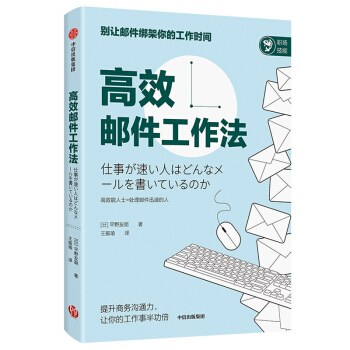Original link: https://www.ixiqin.com/2023/08/21/excerpt-from-the-book-efficient-email-working-method/

- What highly effective people think about most often is “ownership” at work.
- Highly effective people don’t like wasted work. The useless work mentioned here refers to all the work that had to be done because it was not arranged.
- Instead of prioritizing, it saves time to get to work on the task at hand, and gets it done more quickly.
- For example, the content of the first email you open is “Please modify the website information”, it will take about 10 minutes. At this time, if you happen to have other work at hand, you may reply “Got it, I will deal with it before ××, please wait a moment”. But highly effective people take care of this first. It’s not that it’s wrong to reply “I’ll deal with it before ××”, it’s just that the idea of “I’ll deal with it later when I have time” is a kind of procrastination thinking, which is a bit dangerous. From the perspective of completing the work as soon as possible, it is more efficient to deal with it immediately after understanding the content of the email.
- In fact, if some information is added on the basis of the “3W”, the effect of the email will be better. This is “6W+3H”. First add “3W” to “3W”: When…what time Where…what place Whom…who is the object and then add “3H”: How to…How many…How much… Use these to organize the information you want to convey.
- In short, replying to emails is not as fast as possible. The best time to reply should be considered in conjunction with the “purpose”.
- The emails sent are flawless, which is our ideal. But if you miss the time when the other party expects to receive the email because of the pursuit of perfection, the email loses its value. I think we should pay more attention to speed. For the sake of “purpose”, it is understandable to sacrifice a little “correctness”. Thinking about it this way, does it make you feel more relaxed when writing emails?
- Therefore, avoiding excessive use of conjunctions is one way to shorten your emails. Some people think that conjunctions are indispensable for emails, but even without conjunctions, the content of emails is smooth. So decisively delete those unnecessary conjunctions, the coherence of the context will not be affected.
- In fact, it is not difficult to get a reply as soon as possible. Just do the opposite based on the commonalities of the tricky-looking emails listed above. Specifically, it is to make the emails easy to read, easy to judge, and clear in demand. Also, clearly list the benefits of replying (and, more preferably, the downsides of not replying).
- Highly effective people have a keen sense of language. They can not only convey information accurately, but also consciously consider how to make a good impression on the other party. Because even if the information you convey is correct, if the other party does not have a good impression of you, they will not cooperate with you in a happy mood, and may delay the work instead. If you want to improve work efficiency, it is not enough to rely on your own efforts. Only by making the other party cooperate with you happily can you speed up the work process.
- Highly effective people rarely use negative language, and when they do, they try to use positive expressions. For example, they will replace “Assemble on time and don’t be late” with “Please allow enough time to arrive at the assembly location in time”. For another example, they will change “Please do not modify the data at will” to “If you need to modify the data, please contact the person in charge”. In this way, not only will the other party not be angered, but also it will be willing to take the action we want.
- When changing the statement, there are many points to pay attention to, the most important of which is not to apologize for your own behavior, but to thank the other party for his behavior. “Thank you for calling” makes a better impression than “I’m sorry I couldn’t hear from you.”
- Emails can only convey information in words, so it is necessary to prevent the other party from misunderstood the information. If you need to send an email before the information is fully confirmed, in the previous case, instead of writing “I think the payment time is at the end of next month”, you should write “The payment time is at the end of next month. I will contact the accountant after confirming. You contact”. Of course, for many conjectures, forecasts, and content that cannot be asserted, such as strategies that cannot be asserted, it is necessary to express “I predict”, “I personally think”, or “I will confirm the details before…” before conveying, so that the text will be Forget about repeating the phrase “I think/I think”.
- Having said that, it would be unwise to ask questions. In such cases, please use expressions such as “to the extent possible” or “if it is convenient”.
- For the operation of large projects, basic rules such as “determining information sharing objects in advance” and “sending work reports by email” must be set in advance.
- Situations where a phone call is appropriate include: • Things that can be answered on the spot. •Urgent Case. • It is necessary to confirm the understanding level of the other party while explaining. •Because of emotional factors, only express matters that may cause disputes in words. Even if the other party has already sent an email, if you think that the phone communication is faster or less likely to cause misunderstandings, you can take the initiative to communicate on the phone.
This article is reproduced from: https://www.ixiqin.com/2023/08/21/excerpt-from-the-book-efficient-email-working-method/
This site is only for collection, and the copyright belongs to the original author.